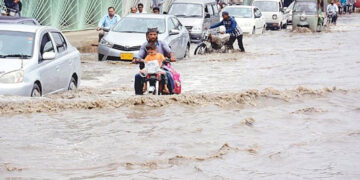Pakistan’s ongoing political crisis deepened after the arrest of former Prime Minister Imran Khan on Tuesday. Khan’s supporters have engaged in violent public rallies across the country, attacking military and governmental structures. The army has been deployed to restore order and internet services have been blocked to prevent further unrest.
Any prospects of a negotiated breakthrough in the continuing political deadlock can be put to rest with the outbreak of new violence between the PTI and the state.
Khan, who took office in 2018 on a platform of anti-corruption, was removed from office in 2022 by a vote of no confidence in the legislature. He has since been challenging the legitimacy of the coalition government led by Prime Minister Shehbaz Sharif, the brother of former Prime Minister Nawaz Sharif who was also convicted of corruption. Khan has had more than a hundred legal proceedings brought against him, but he has always maintained his innocence and charged the military and government with plotting against him.
The arrest took place in a dramatic manner at the Islamabad High Court, where Khan was supposed to appear for a hearing. Paramilitary forces broke into the court premises and dragged Khan out of the building into an armored vehicle. Khan’s lawyer was injured in the scuffle. Khan released a pre-recorded video message after his arrest, calling on his supporters to come out and defend their rights and democracy.
Thousands of Khan’s supporters heeded his call and staged protests in several cities, including Islamabad, Lahore, Karachi, Peshawar and Quetta. They burned tires, threw stones, vandalized public property and clashed with police and security forces. Some protesters also broke into the residences of army personnel and the headquarters of the army in Rawalpindi, accusing the military of being behind Khan’s arrest.
The government has imposed a ban on public gatherings and shut down mobile internet services to quell the chaos. It has also accused Khan of inciting violence and destabilizing the country.
Khan, according to the interior ministry, was detained on suspicion of corruption. However, subsequent events—in particular, Mr. Khan’s new altercation with the military—seem to imply that he might have been apprehended for an entirely different reason.
The political turmoil in Pakistan comes at a time when the country is facing economic challenges, security threats and diplomatic pressures. The arrest of Khan has deepened the polarization and mistrust between his supporters and opponents, as well as between the civilian government and the military. The situation poses a serious threat to Pakistan’s stability and democracy.
The government and establishment are now even more embroiled in controversy as a result of Mr. Khan’s arrest, and the public’s mistrust of their policies is only going to grow. With the country teetering on the brink of a total default, the absolute last thing it needs is more instability.




























